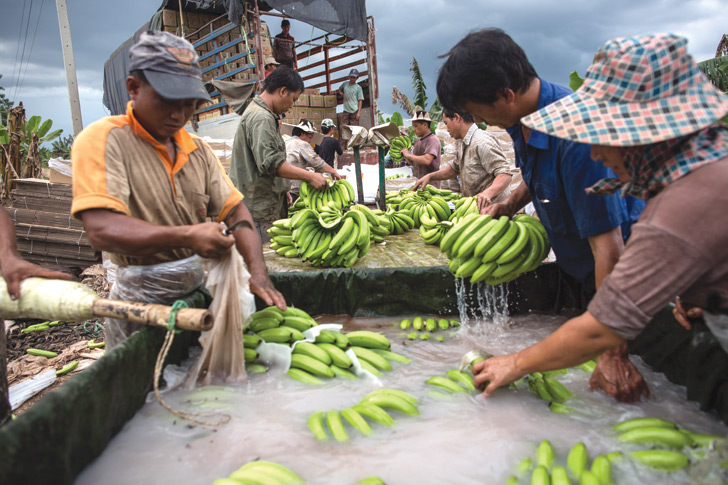Philippine banana bonanza sparks debate on shift to China
Exports have soared but is Duterte getting enough in return for his strategic pivot?
The Philippines has boasted of an early win in its pivot from the US to China: a surge in sales of tropical fruits for which President Rodrigo Duterte’s home island is renowned.
Exports of Philippine bananas have soared since the outspoken leader’s landmark October trip to Beijing led China to lift import curbs imposed in the wake of maritime territory dispute.
Manila’s banana diplomacy underlines the fruit’s role as a bellwether of the country’s domestic politics and Asia’s security dynamics. It has also raised questions about whether Mr Duterte is getting enough in return for a strategic shift in which he has embraced China and poured scorn on the US, a longtime ally, since taking office last June.
“There is something symbolic in those banana exports,” said Professor Herman Kraft, a political scientist at the University of the Philippines. “They symbolised the break in bilateral relations between the Philippines and China. Now they seem to be the harbinger of the normalisation of relations.”
Mr Duterte gave thanks to China last week for having “lightened up the economic life of our country”, including by buying more fruit and vegetables. He gave a speech praising President Xi Jinping and the Chinese people “for loving us and giving us enough leeway to survive the rigours of economic life”, according to local media reports.
Manila has also touted a looming deal for China to buy a further $1bn of agricultural produce, ranging from delicate mangosteens to pungent durians. Many of these delights come from the fertile southern island of Mindanao, where Mr Duterte’s more than two decades as mayor of Davao City opened his path to the presidency.
Boo Chanco, a columnist at the Philippine Star newspaper, said the China import boom showed his country was “pretty much a ‘banana’ republic”. He noted that the fruit was a subject “close to the gut” for politicians, particularly because plantations were such an important part of the rural economy in “Duterte’s backyard” of Mindanao.
“President Duterte knows his priorities, it seems,” Mr Chanco said.
Philippine banana exports to China plunged more than two-thirds in volume between 2014 to 2016, as Manila pressed ahead with a case at an international tribunal that ended with a stinging ruling last July against Beijing’s claims in the South China Sea. China had months before destroyed allegedly pesticide-contaminated Philippine bananas and then suspended imports from some companies.
But banana sales rose again sharply beginning around the time Mr Duterte announced more than $13bn of trade and investment deals with China — as well as Manila’s “separation” from Washington. Sales to China in the last quarter of 2016 were more than double those a year earlier, according to official export data. By December China accounted for almost a quarter of Philippine banana exports.
Yet the figures also suggest the story is not quite the straightforward success Mr Duterte and his ministers have promoted. Total Philippine banana exports surged at an even faster rate towards the end of last year.
China also appears to have paid about $322 a tonne in December, with the rest of the world averaging about $382. Banana exports to China then fell more than 20 per cent in January compared with a year earlier, according to preliminary data.
Mark Schlarbaum, Irvine, California
